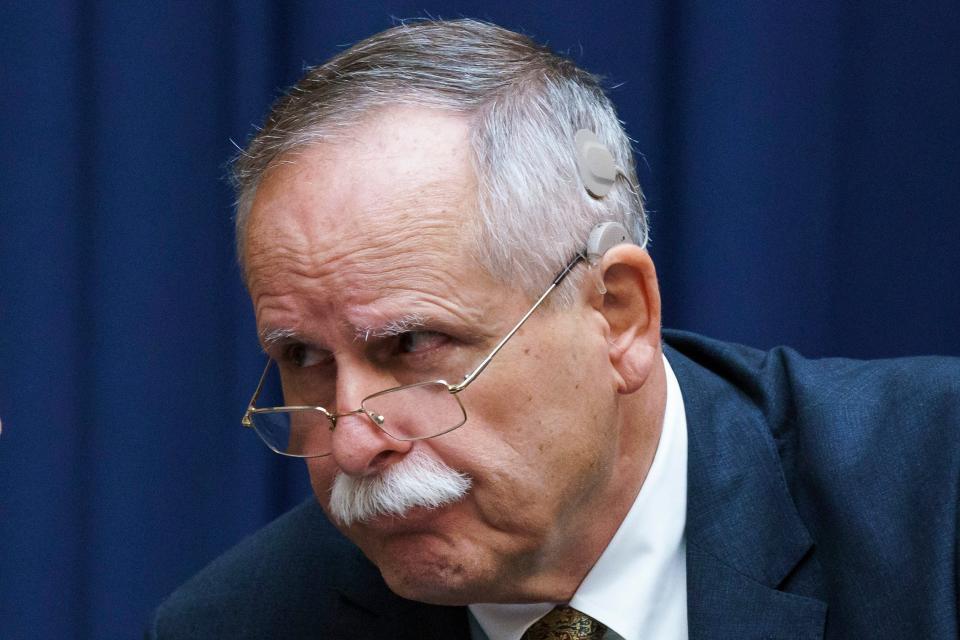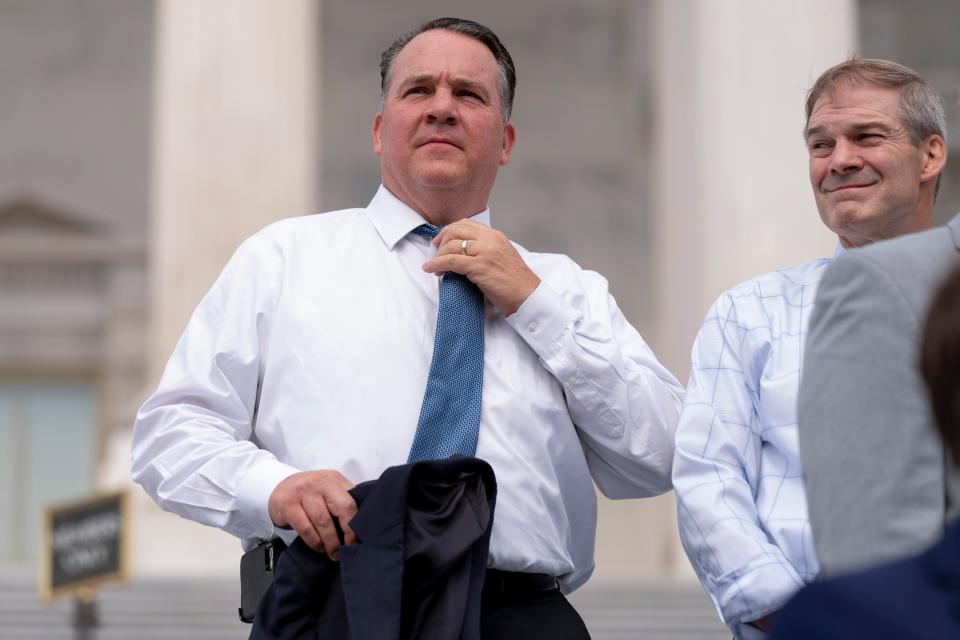US House race in West Virginia pits the clout of Trump against the importance of infrastructure
- Oops!Something went wrong.Please try again later.
- Oops!Something went wrong.Please try again later.
- Oops!Something went wrong.Please try again later.
- Oops!Something went wrong.Please try again later.
The crumbling roads and bridges of West Virginia could be the path to the U.S. Capitol in one of the hardest-fought House Republican primaries this year.
Two GOP congressmen face off in the same district Tuesday after population loss caused West Virginia to lose one of its three House seats. How Reps. David McKinley and Alex Mooney voted on last year's bipartisan infrastructure bill could keep one of them in Washington and send the other home.
Infrastructure may not seem like a top issue when inflation is squeezing American families and a leaked Supreme Court opinion has inflamed public debate over Roe v. Wade. But it matters a lot in a state that ranks among the worst for its roads and bridges.
"It's very important for us," Sen. Joe. Manchin, D-W.Va., told USA TODAY.
Since his vote in November, Manchin has repeatedly touted the roughly $6 billion the infrastructure bill will send to West Virginia for its most urgent needs.
"Every single West Virginian will benefit from this bill," he said.
Manchin was a key player in brokering the roughly $1.2 trillion bipartisan infrastructure package President Joe Biden signed last fall – and for good reason. The Mountain State historically is one of the largest beneficiaries of federal transportation spending. For every dollar its citizens contribute in gas taxes and other fees, the state receives nearly $2 to spend on its highways, studies show.
The Democratic senator took the unusual step of endorsing in a Republican primary, throwing his support behind McKinley, one of 13 House Republicans who voted for the infrastructure deal in November. Mooney voted against it and earned former President Donald Trump's endorsement shortly thereafter. Trump slammed the 13 House members as "RINOs" (Republicans in name only) who "should be ashamed of themselves."
Trump wins Ohio: Donald Trump won Ohio for J.D. Vance. Can he score victories in Pennsylvania, North Carolina and Georgia?
Primaries to watch: These 10 House races could decide which party controls Congress

Why the infrastructure bill matters in the West Virginia primary
The West Virginia primary is one of only five races in the country pitting two incumbents against each other. It's also the first test of the infrastructure bill's political weight, serving as a proxy fight to measure Trump's political power in a primary race.
A civil engineer by trade, McKinley has been explaining since November why he voted for the bill in the simplest terms: "We needed it."
West Virginia, where some roads and bridges haven't been repaired in 50 to 70 years, has repeatedly received a "D" grade from the American Society of Civil Engineers.
U.S. Department of Transportation records show 1,545 of West Virginia's bridges are in poor condition – the highest rate in the country. The state has the second-highest rate of power outages in the country because of an unreliable power grid. More than 258,000 West Virginians lack access to broadband.
"Tonight, instead of playing politics, I put America and West Virginia first," McKinley said Nov. 5 after he voted for the $1 trillion bipartisan infrastructure deal.
Manchin and Sen. Shelley Moore Capito, R-W.Va., also voted for the deal. Both of them helped to negotiate what was in it.
McKinley, a five-term congressman, was the only Republican House member from West Virginia to vote for the infrastructure deal.
He noted that Trump proposed a $2 trillion infrastructure plan during his administration, "but Democrats played politics and made sure it did not happen."
West Virginia is set to receive billions from the deal, including:
$6 billion for roads and bridges.
$5 billion to upgrade the electric grid.
$900 million to reclaim abandoned mines and plug abandoned wells.
$600 million to expand broadband, including financial support to help 543,000 low-income West Virginians access the internet.
$475 million to upgrade, repair and replace old drinking water pipes and sewer systems.
$300 million for public transportation.
$40 million for airports.
Capito has not endorsed in the House race, but last month, she said McKinley's vote "was absolutely the right vote."
'We're finally getting this done': Biden signs landmark infrastructure package in major win for domestic agenda
Mooney's vote against an infrastructure bill that helps W.Va. could be good for him

Mooney, a four-term congressman who spent part of his career as a congressional staffer, called the GOP House lawmakers who voted for the infrastructure deal "Republican sellouts."
On the campaign trail, Mooney labeled McKinley as a Republican in name only – the RINO moniker that gets doled out lately to any party member who doesn't fall in line with Trump. His attack ads and mail against McKinley aimed at his infrastructure vote.
In a phone rally with Mooney last week, Trump highlighted the infrastructure vote.
"Congressman Mooney is a conservative warrior running in West Virginia’s 2nd Congressional District. His opponent is a RINO who supported the ‘Unfrastructure Bill’ and the Sham January 6th Unselect Committee," Trump said in a statement before the call.
Mooney, a member of the House Freedom Caucus, has supported smaller infrastructure bills and said the $1.2 trillion Biden plan was too expensive, though that was far less than the $2 trillion measure Trump called for. Mooney said he wanted a bill that focused on roads and bridges.
"The price tag far exceeds anything reasonable and further adds to our country's ballooning debt," he said in November when he voted against Biden's bill. He called for a measure that was less than half its amount.
Tuesday, voters will decide whether billions worth of infrastructure improvements in West Virginia is a more persuasive argument than Trump's endorsement.
One political analyst suggested it may come down to geography and district lines.
McKinley represents significantly more of the new district than Mooney does, said Kyle Kondik at the University of Virginia Center for Politics.
"That's historically a big advantage in these kinds of races, but maybe it doesn't mean as much because of how nationalized and ideological things are," he said.
Why it matters: Voters get fewer choices as Democrats and Republicans dig partisan trenches in redistricting
Candy Woodall is a Congress reporter for USA TODAY. She can be reached at cwoodall@usatoday.com or on Twitter at @candynotcandace.
This article originally appeared on USA TODAY: West Virginia primary puts Biden infrastructure bill against Trump

